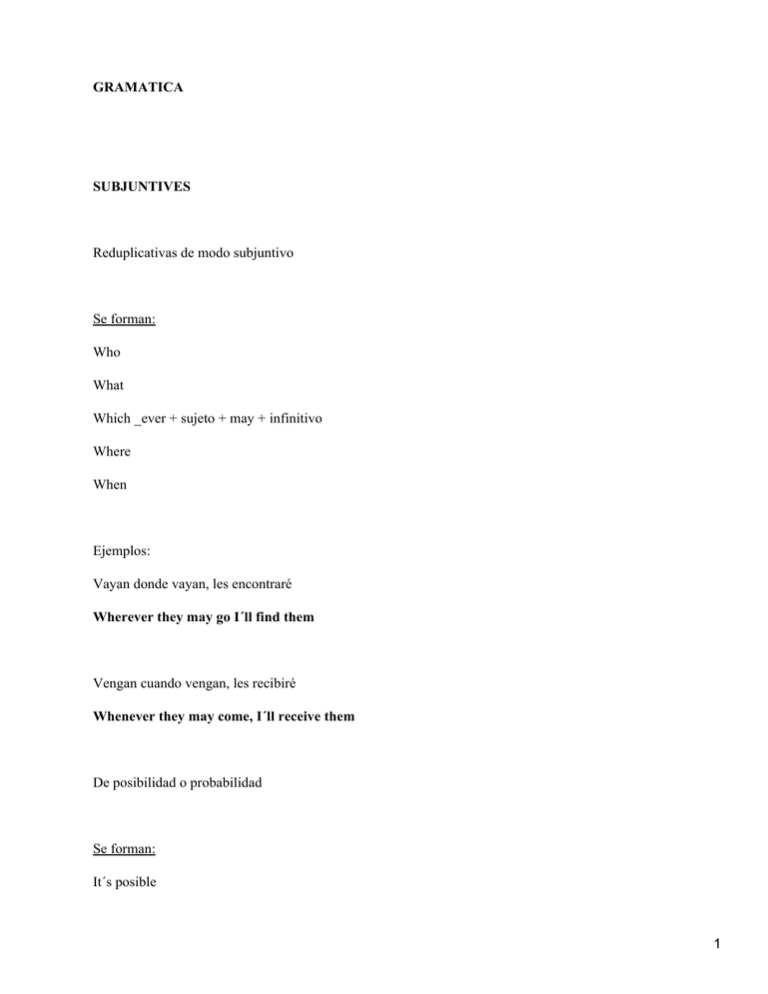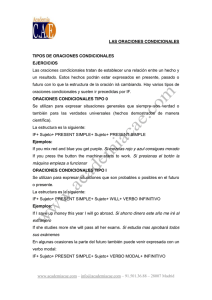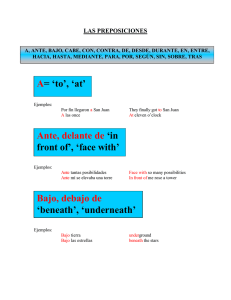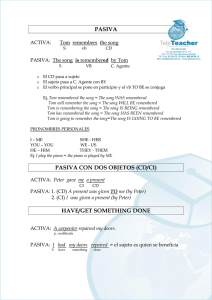Subjuntivos
Anuncio

GRAMATICA SUBJUNTIVES Reduplicativas de modo subjuntivo Se forman: Who What Which _ever + sujeto + may + infinitivo Where When Ejemplos: Vayan donde vayan, les encontraré Wherever they may go I´ll find them Vengan cuando vengan, les recibiré Whenever they may come, I´ll receive them De posibilidad o probabilidad Se forman: It´s posible 1 Maybe ......+ sujeto + future It may (puede) Ejemplos: Tal vez apruebe el próximo año Maybe I´ll pass the next year Puede q llueva Maybe It´ll rain De modo condicional: Tipo I: If + pasado + condicional simple Ejemplos: Si lo pensaras mejor, vendrías + veces If you though it better, you would come more times Te lo daría, si me lo devolvieses I would give you, if you gave it back to me Tipo II: If + pasado perfecto + condicional compuesto 2 Ejemplos: Si lo hubieses terminado a tiempo, habríamos buscado otra solución If you had finished it on time, we would have looked for another solution Ellos me habrían ayudado, si yo hubiera estado aquí They would have helped me, if I had been here Exclamativas: Se forman: I wish (ojala) + sujeto + pasado perfecto If only (al menos) Ejemplos: Ojala vinieran hoy I wish they came today Preferiría q no vinieseis tan tarde I wish you didn´t came so late Si al menos fuera cierto! If only were true! Dependiente de una impersonal: 3 Se forma: It´easy It´s dificult ......+ for + objeto + to + infinitivo It was neccesary It was impossible Ejemplos: Es fácil q lo hagan It´s easy for them to do it Era imposible q aparecieran tan pronto It was imposible for them to appear so son Será necesario q lo averiguen + pronto It will neccesary for them to find out so son HAVE / GET (Causative) (Me ha cortado el pelo, he arreglado el coche....) Cuando alguien lo ha hecho x nosotros. 4 Se forma: Have + nombre/nombre de la frase (su pelo, tu diente...) + participio pasado Ejemplos: Voy a pintar mi casa I´m going to paint my house I´m going to have my house painted Debemos ir al dentista xa q nos saquen un diente We must go to the dentit to have (get) our tooth pulled out VOZ ACTIVA / VOZ PASIVA Estructura de la frase pasiva Greenpeace has presented a new campaing against whale hunting Sujeto activo verbo activo objeto activo A new campaign aginst whale hunting has been presented by Greenpeace Sujeto pasivo verbo pasivo agente 5 Verbs followed by to infinitive Ask, agree, arrange, choose, decide, expect, happen, seem, hope, learn, need, offer, prepare, promise, refuse, want Verbs followed by gerund Admit, aoid, consider, deny, detest, dislike, enjoy, mind, can´t stand, fancy, feel like, finish, forgive, give up, can´t help, keep on, practise, suggets 6


